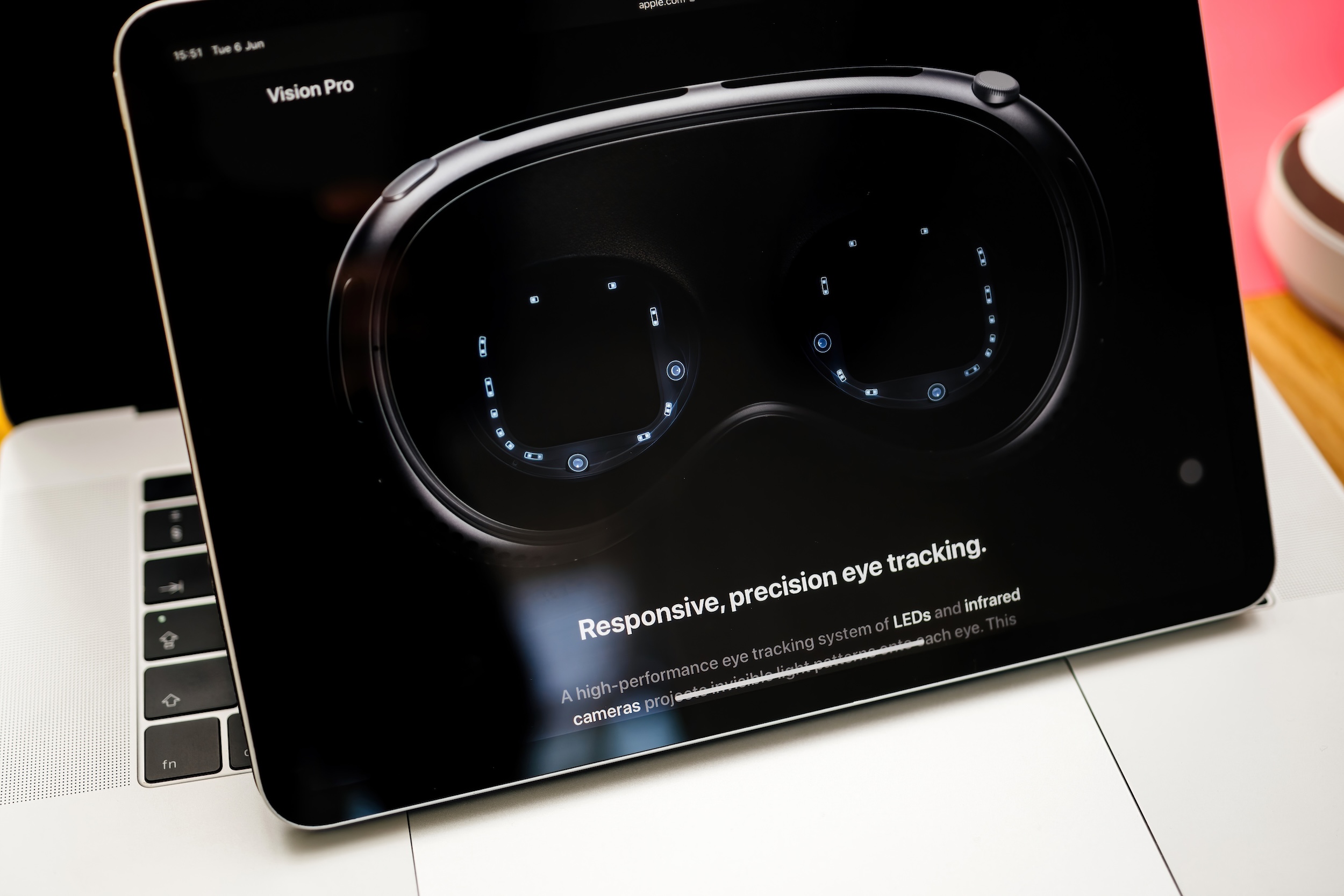The Tipping Point for Spatial Computing in Enterprise
When Apple announced Vision Pro, it framed the headset as the start of a new era of spatial computing in enterprise. Within weeks, companies like SAP, Cisco, Lowe’s, and KLM had launched pilot apps that put spatial computing at the center of dashboards, design reviews, and hands-on training.
Why Vision Pro Changes the Game
Vision Pro’s 23-million-pixel micro-OLED displays, ultra-precise eye- and hand-tracking, Optic ID security, and visionOS—built on the same foundations as iOS—give IT leaders the compliance posture they already trust while unlocking truly immersive spatial computing in enterprise.
Because MDM, SSO, and VPN controls are identical to iPhone, spatial computing deployments fit neatly into existing governance models—one more reason adoption is accelerating.
Infinite, Private Workspaces
Develop immersive training scenarios and simulations designed to improve skills, reduce risks, and enhance retention across various industries.
3-D Design Collaboration Without the Learning Curve
PTC’s Onshape Vision streams cloud-native CAD directly into Vision Pro so engineers and non-technical stakeholders alike can explode, inspect, and walk through full-scale assemblies. Meetings that once relied on screenshots now take place inside the model—proving again how spatial computing in enterprise shortens design cycles.
KLM’s Engine-Shop Training Success
Grounding a jet for training costs fortunes. KLM’s Engine Shop app overlays step-by-step procedures, torque specs, and wiring routes on a virtual Trent 1000 engine, letting trainees practice with authentic gestures while aircraft stay in service. Early metrics show fewer errors and faster certifications—a textbook ROI for spatial computing.
Guided Fieldwork & Remote Expertise
Front-line technicians benefit from heads-up spatial computing in enterprise, too. Vision Pro understands depth, so remote experts can anchor 3-D annotations precisely where a bolt or breaker lives, slashing truck rolls and mean-time-to-repair.
Retail Showrooms That Travel Home
Lowe’s Style Studio lets customers swap 80 billion kitchen combinations at life size in their own homes, turning flat catalogs into hyper-personal spatial computing experiences that boost conversion and shrink returns.
Economics of Spatial Workflows
Front-line technicians benefit from heads-up spatial computing in enterprise, too. Vision Pro understands depth, so remote experts can anchor 3-D annotations precisely where a bolt or breaker lives, slashing truck rolls and mean-time-to-repair.
Implementation Road-Map for CIOs
- Identify high-value spatial moments—maintenance, design reviews, data walls.
- Start with one pilot to measure ROI fast.
- Leverage Apple’s Enterprise Spatial Design Lab for rapid prototyping.
- Plan secure content pipelines (USDZ, photogrammetry, cloud CAD).
- Iterate and scale once metrics validate the investment.
Tip: Frame Sixty has deployed these pipelines end-to-end. Learn how we build Vision Pro apps.
Best-Practice Patterns Across Industries
-
Infinite data canvases for analytics teams
-
Life-size digital twins for manufacturing
-
Gesture-based SOPs for healthcare and factory floors
-
Context-aware overlays for utilities and energy
-
Immersive configurators for retail and real estate
Each pattern proves the versatility of spatial computing in enterprise, and all are in live production today.
Take the Next Step With Frame Sixty
Spatial computing in enterprise is no longer a prototype—it’s a profit center. If you’re ready to launch or scale Vision Pro solutions, Frame Sixty delivers the strategy, design, and engineering to make them real.
Contact us today at framesixty.com/contact to turn your first idea into a production-ready Apple Vision Pro application.
FAQs
Ready to explore spatial computing in enterprise but still have questions? The FAQ below addresses the most common concerns we hear from IT leaders, heads of innovation, and business stakeholders evaluating Apple Vision Pro solutions.
How heavy is the device, and can employees wear it all day?
he headset weighs roughly 600 g (varies by Light Seal and battery placement). Most pilots schedule 30- to 60-minute sessions, but adjustable straps, prescription inserts, and swappable batteries keep longer use comfortable for many knowledge-worker tasks.
Does Vision Pro support prescription lenses?
Yes. Apple partners with Zeiss to offer magnetic prescription inserts. Enterprises purchasing devices in bulk can preload employee prescriptions through Apple’s enterprise sales channel or issue inserts individually.
Is Vision Pro safe for secure or classified environments?
Vision Pro supports MDM, VPN, and single-sign-on, plus Optic ID and on-device processing for eye-tracking data. For high-security zones, disable outward-facing cameras, enforce offline mode, or use privacy shields per departmental policy.
Can we reuse our existing 3-D assets (CAD, BIM, FBX)?
Yes. Convert models to USDZ or Reality Composer scenes; Frame Sixty provides automated pipelines for Onshape, SolidWorks, Revit, and other formats to keep asset libraries in sync.
How does Vision Pro connect to real-time data sources?
Use REST, GraphQL, or WebSocket APIs—just like iOS. visionOS supports URLSession, Combine, and the same secure networking stacks, so dashboards and digital twins can stream live telemetry or IoT sensor data.
What about integrating AI services (e.g., Copilot, ChatGPT)?
In addition to integrating AI services such as ChatGPT, you can embed on-device Core ML models or call cloud LLM endpoints. Popular patterns include voice-controlled SOP assistance, anomaly detection overlays, and AI-generated maintenance reports—all rendered within the spatial scene.
What ROI should we expect, and how do we measure it?
Typical pilots track KPIs like cycle-time reduction (design reviews), downtime avoided (maintenance training), sales lift (retail configurators), and error rates (field service). Many clients see positive ROI within one or two quarters.
How many headsets do we need for a successful pilot?
Most enterprises start with 5–15 units: one or two for each workflow persona plus one spare for dev/QA. Frame Sixty helps right-size hardware pools and rotates devices between sites if needed.
What ongoing support is required?
Plan for quarterly OS updates, device-health monitoring via MDM, and periodic asset-library refreshes. Frame Sixty offers managed services that cover firmware updates, content pipeline maintenance, and analytics dashboards.

